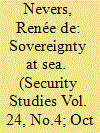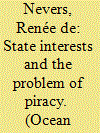| Srl | Item |
| 1 |
ID:
087453


|
|
|
|
|
| Publication |
2009.
|
| Summary/Abstract |
The use of contractors employed by private security companies (PSCs) has exploded in recent years, outpacing efforts to assess the consequences of increased reliance on PSCs for international humanitarian law (IHL). This matters both for the states that hire these companies and for the employees of PSCs on or near battlefields. This article examines the legal status of PSCs under the existing IHL framework, focusing on activities where PSC employees carry weapons and how the presence of PSCs in asymmetric conflicts increases the challenge of determining what actions are appropriate within the laws of war. In most cases, PSC employees cannot be accorded combatant status under IHL. However, the actions of private contractors may put their protection as civilians under IHL at risk, and this is particularly true in asymmetric conflicts. I argue that changing the status of PSCs on the battlefield under IHL to take into account the tasks they are performing is not the answer. Rather, bearing IHL in mind, states need to rethink the tasks that PSCs conduct on their behalf, even if this means reducing reliance on PSCs or limiting state military activities. Notably, the USA should re-evaluate its reliance on PSCs to conduct tasks in situations where PSC employees are likely to be pulled into hostilities.
|
|
|
|
|
|
|
|
|
|
|
|
|
|
|
|
| 2 |
ID:
143741


|
|
|
|
|
| Summary/Abstract |
The oceans present a variety of perils to both states and private actors, ranging from smuggling to direct attacks on vessels. Yet, a disconnect exists between states’ maritime power and sovereign fleets due to the emergence of open shipping registries in the 20th century. How have great powers like the United States responded to threats generated by transit of the oceans for legitimate and illicit purposes? The nature of peacetime security threats that states confront at sea has shaped divergent responses. The main maritime powers draw a distinction between threats aimed at states and threats to commerce. Where perceived threats to the state are concerned, great powers have sought to revise understandings of the protections sovereignty provides—specifically, by seeking expanded interdiction rights—to further their own security goals. When maritime powers perceive that international commerce is under threat, they delegate the sovereign protection function both upward to internationally sanctioned maritime coalitions and outward to private security firms. These policies are responses to the security challenges that result from the decoupling of sovereign power and the merchant fleet that followed the emergence of open shipping registries.
|
|
|
|
|
|
|
|
|
|
|
|
|
|
|
|
| 3 |
ID:
139204


|
|
|
|
|
| Summary/Abstract |
The U.S. and the UK supported the introduction of PMSCs on merchant vessels to address Somali piracy. This article describes U.S. and UK regulations and guidelines for PMSCs and shippers seeking to hire them. A central concern for each has been ensuring control of the weapons to be used by PMSCs. The U.S. has also sought to vet contractors to ensure the security of U.S. ports and transport facilities, while the UK has focused on ensuring that contractors and companies meet its firearms requirements. These distinctions reflect differences in the regulation of firearms in the U.S. and the UK.
|
|
|
|
|
|
|
|
|
|
|
|
|
|
|
|